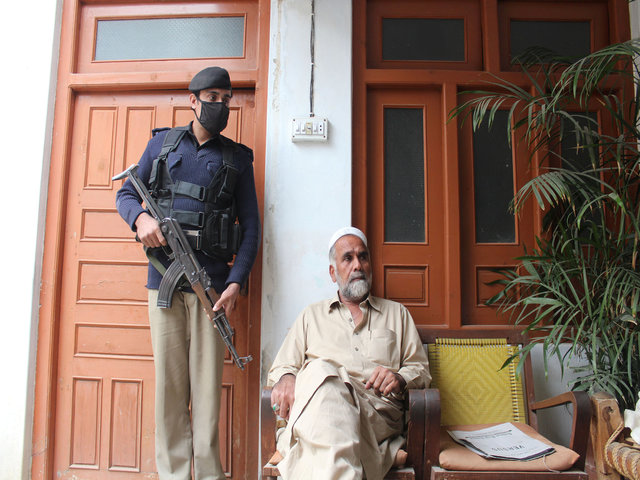
The menacing call was taken seriously in a northern pocket of the country where Tehreek-e-Taliban Pakistan insurgents took partial control in 2007, before being ousted two years later in a major military operation hailed as a telling blow against militant violence.
Locals fear that recent threats of extortion and a spate of targeted killings earlier this year mark an attempt by the Taliban to regain a foothold in the picturesque, mountainous area they once ruled with an iron fist.
Panic grips Karachi as pro-Taliban graffiti surfaces
Western powers, including the United States which has thousands of troops fighting other militant groups across the nearby border in Afghanistan, want to see militant networks along the frontier crushed. During the October 19 conversation, Mullah Akhtar, a commander close to Tehreek-e-Taliban Pakistan (TTP) chief Mullah Fazlullah, ordered Rahim to collect money from 15,000 members of the Swat Traders' Federation, of which he is president. But in a tense exchange, Rahim refused to cooperate, and told Akhtar militants were not welcome in Swat. According to Rahim, Akhtar boiled over with rage: "I will blow you up, so that even the doctors won't be able to find the pieces."
Since the call, Rahim's life has changed. Speaking to Reuters in Swat's main town of Mingora, he stood flanked by two armed policemen, while plainclothed officers keep a watchful eye in the background. CCTV cameras monitor his home.
Motives unclear
Representatives of the militant movement could not be reached for comment on their tactics in Swat Valley; some residents believe demands for money and a rise in attacks in the first half of the year are signs of desperation.
Attacks have been a part of life there since 2010, including the attempted assassination of Nobel laureate Malala Yousafzai in 2012, but in recent months the murders have stopped after a series of arrests by police. The Taliban have also struggled to build ideological support after their bloody two-year rule that saw them impose Sharia law on the valley's 2 million residents.
Taliban cadre may have relocated to Afghanistan
The group remains active elsewhere, however, particularly in Balochistan, where a faction of the Taliban and Islamic State have claimed responsibility for a series of bomb and gun attacks that have killed more than 180 people.
The Pakistan Army will be desperate to keep the Taliban out of Swat, the first sizeable region outside lawless tribal areas bordering Afghanistan to fall to the militants. The army's publicity wing did not respond to requests for comment on the situation in the area.
The military has been on alert for signs of a Taliban resurgence as it seeks to rebuild civilian institutions and win over the local population as a bulwark against radical ideology.
A force of more than 4,000 Pakistani soldiers is stationed in Swat, and last month the army began constructing a permanent garrison. "It (Swat) was always shown as the example of a successful military operation," said Zahid Hussain, a security analyst.
"But the main challenge is to hold that area, and to now establish a civilian authority."
Neutralising support networks
While officials tout the recent drop in assassinations by the Taliban as progress, locals on the group's hit-list are less sanguine. Powerful tribal leaders, especially those who worked with anti-Taliban peace committees, say they are in danger.
Three Afghan Taliban leaders arrested
Fazal Wahab, for example, walks through Mingora's bustling market hiding a pistol under his coat and wearing a black anti-pollution face mask to hide his identity.
"I have received no support of any kind from the army," said Wahab, who has faced Taliban death threats for years due to his work.
But local officials say security has improved. More than 2,000 Taliban fighters from Swat have been driven into mountainous areas on the Afghan side of the border nearby, according to officials.
Police in Swat said TTP assassins used little-trodden mountain passes between Afghanistan's Nuristan and Pakistan's Chitral regions to sneak into the valley. "It's not difficult for one or two people to slip through," said Akhtar Hayat Khan, Swat's police chief.
Khan said several intelligence-led swoops on local facilitators had disrupted the Taliban's support network and limited the threat. In July, police arrested at least 12 people across the valley suspected of aiding attacks.
“Dog eat dog”
Local traders applauded Rahim's stand against the Taliban, but some were not sure if they would follow his example if faced with demands for protection money themselves. "If we get a call, then what can we do? We will bear the decision like a stone on our hearts, but we have no choice," said Nisar Ahmed.
Afghan Taliban consider options on resuming talks
Rahim is steadfast in his resistance. Recently he started breeding dogs, widely considered unclean in Islam, for his own protection. "I used to hate keeping dogs. But you need to keep a dog to fight a dog," he said. "They (the Taliban) are hungry now. And like a dog bites a man out of hunger, they're biting, too."











COMMENTS
Comments are moderated and generally will be posted if they are on-topic and not abusive.
For more information, please see our Comments FAQ